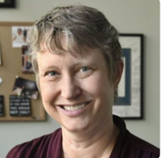Membership Spotlight: Andrea M. Hussong, PhD
Membership Spotlight: Andrea M. Hussong, PhD

Name:
Andrea M. Hussong, Ph.D.
Bio:
License #:
3007
Bio:
Andrea is a licensed clinical psychologist and developmental scientist with over 30 years of research in promoting health and well-being in children, youth, and families. Before joining the faculty at the Department of Psychology at the University of North Carolina in 1997, she obtained a BA in psychology from Indiana University and a doctorate in clinical psychology from Arizona State University. She then completed a postdoctoral fellowship at the Center for Developmental Science at UNC-CH - where she would return to serve as director from 2011-2018. Her research focuses on developmental pathways to substance use and disorder, particularly for children of drug-involved parents. Through this work, she has collaborated with quantitative methodologists to apply innovative methods for longitudinal data analysis and co-develop integrative data analysis. More recently, her research focuses on positive youth development and resilience, including how parents foster gratitude in children. This focus allows her to engage in translational science, using developmental science, design-based and community engaged methods, and digital tools to create programs that support youth in the transition to young adulthood and families in coping with the challenges of parental drug addiction.
What attracted you to the field of psychology?
“So, I am a 1st generation college student and worked a lot of jobs to get through college. And it was some of those work study jobs that I had early on that attracted me to the field. Some of them were working in research labs. But I also worked in a halfway house for adults who were coming out of a State psychiatric facility, and I lived with them - I was the live in person providing support at night. So, I had a variety of touch points through those jobs that gave me different versions of insight into what this field might be about. But, in the end, I was naive and just went for it.”
“So, I am a 1st generation college student and worked a lot of jobs to get through college. And it was some of those work study jobs that I had early on that attracted me to the field. Some of them were working in research labs. But I also worked in a halfway house for adults who were coming out of a State psychiatric facility, and I lived with them - I was the live in person providing support at night. So, I had a variety of touch points through those jobs that gave me different versions of insight into what this field might be about. But, in the end, I was naive and just went for it.”
What do you enjoy most about your work?
“There's sort of two things I enjoy most about my work. Part of it has to do with training students and helping them figure out who and what they want to become as professionals, because everybody comes in with some notion of how they want to do their part of saving the world. Helping them translate that desire into something they can do for a job is pretty fulfilling. The other part - I really love trying to understand how people develop – how they change or stay the same. And so, the research that I do is really about how people develop the way they do, along with various ways of thinking about resilience. There's hope in that, so I enjoy that too.”
“There's sort of two things I enjoy most about my work. Part of it has to do with training students and helping them figure out who and what they want to become as professionals, because everybody comes in with some notion of how they want to do their part of saving the world. Helping them translate that desire into something they can do for a job is pretty fulfilling. The other part - I really love trying to understand how people develop – how they change or stay the same. And so, the research that I do is really about how people develop the way they do, along with various ways of thinking about resilience. There's hope in that, so I enjoy that too.”
What advice would you give someone who is considering getting a degree in psychology?
“When I have these conversations, I usually want to understand what the person thinks the degree means and what they think it will bring for them - and if what they want seems aligned with how I understand the field versus so many other helping fields. My most general advice is to spend some time volunteering and just doing the type of work that most interests them - to make sure that they really like research or working with people so that they can figure that out first-hand because I think it's really hard to figure that out in a classroom.”
“When I have these conversations, I usually want to understand what the person thinks the degree means and what they think it will bring for them - and if what they want seems aligned with how I understand the field versus so many other helping fields. My most general advice is to spend some time volunteering and just doing the type of work that most interests them - to make sure that they really like research or working with people so that they can figure that out first-hand because I think it's really hard to figure that out in a classroom.”
When you are not working, what do you enjoy doing?
“I have a secret hobby that I'm sharing with you right now. I like to write children’s and young adult literature - fiction and short stories. I am not published but I enjoy doing it and have been working with different writing groups over the years. And that's been one of the hobbies that I most enjoy.”
“I have a secret hobby that I'm sharing with you right now. I like to write children’s and young adult literature - fiction and short stories. I am not published but I enjoy doing it and have been working with different writing groups over the years. And that's been one of the hobbies that I most enjoy.”
What is something about you (a fun fact) that not many people know?
“I’m from a very small town in Indiana – Lebanon, Indiana. I come from a family where many people didn't finish high school, much less go to college. I have fumbled my way into my career. This career trajectory is not at all planned, even though I can tell a story that may sound that way.”
“I’m from a very small town in Indiana – Lebanon, Indiana. I come from a family where many people didn't finish high school, much less go to college. I have fumbled my way into my career. This career trajectory is not at all planned, even though I can tell a story that may sound that way.”
If you were not a psychologist, what would you do?
“I would be a writer. I feel like it uses so many of the same skill sets of a psychologist. Trying to understand why people do what they do, but with more detail.”
“I would be a writer. I feel like it uses so many of the same skill sets of a psychologist. Trying to understand why people do what they do, but with more detail.”
What is the next place on your travel bucket list?
“I think probably the next place on my travel bucket list would be up toward Alaska to see the open wilderness. We haven't gone up that direction. And I have a wedding anniversary coming up that may pull us north.”
“I think probably the next place on my travel bucket list would be up toward Alaska to see the open wilderness. We haven't gone up that direction. And I have a wedding anniversary coming up that may pull us north.”
What are you currently reading or listening to?
“I always have several stories open at once. Something I finished recently was Neverwhere by Neil Gaiman. But other than that, I read a lot of mysteries, and short stories and that type of thing, but that's the latest.”
“I always have several stories open at once. Something I finished recently was Neverwhere by Neil Gaiman. But other than that, I read a lot of mysteries, and short stories and that type of thing, but that's the latest.”
What is your favorite word and why?
“’Liminal’. I think there's so much opportunity in liminal space, and I think the word liminal just has a beauty to it by itself, that pushes you from one “L” to the other - that feels like what it is.”
“’Liminal’. I think there's so much opportunity in liminal space, and I think the word liminal just has a beauty to it by itself, that pushes you from one “L” to the other - that feels like what it is.”

